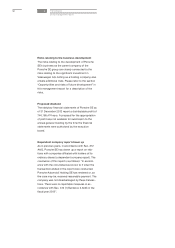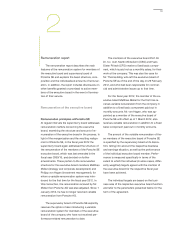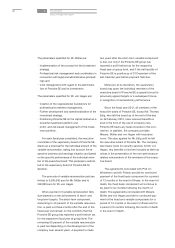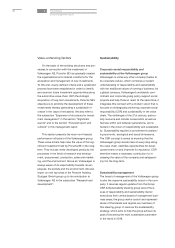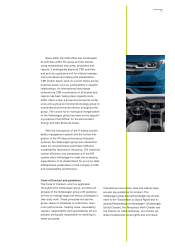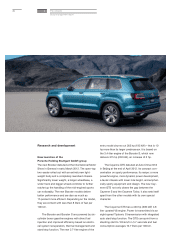Porsche 2012 Annual Report Download - page 72
Download and view the complete annual report
Please find page 72 of the 2012 Porsche annual report below. You can navigate through the pages in the report by either clicking on the pages listed below, or by using the keyword search tool below to find specific information within the annual report.
29 February 2012. He also received no remunera-
tion for holding other offices in the Porsche Holding
Stuttgart GmbH group.
In addition to the remuneration received from
Porsche SE in the fiscal year, total remuneration for
Prof. Dr. Winterkorn and Mr. Pötsch includes remu-
neration for serving on the board of management of
Volkswagen AG, as well as for holding other offices
in the Volkswagen group and in the Porsche Holding
Stuttgart GmbH group in the fiscal year 2012. On
the basis of the amendment of Art. 13 (2) of the
Porsche AG’s articles of association regarding re-
muneration of the members of the supervisory
board of Porsche AG, which was entered in the
Stuttgart commercial register on 13 December
2012, Prof. Dr. Winterkorn and Mr. Pötsch no longer
receive remuneration for serving on the supervisory
board of Porsche AG with effect as of 1 August
2012. As regards the scope of the amendment to
the articles of association of Porsche AG, we refer
to the explanations of the remuneration of the su-
pervisory board below.
Remuneration principles at Volkswagen AG
The positive business performance of the
Volkswagen group in the fiscal years 2011 and 2012
made it necessary to modify and realign the existing
remuneration system and the remuneration of the
Volkswagen AG board of management and the
comparative parameters on which it is based. The
remuneration of the board of management was
modified with the assistance of a remuneration
consultant, whose independence was assured by
the management board and Volkswagen AG.
Material changes to the remuneration system
relate to the bonus, the calculation of which will be
realigned to reflect business development. It now
explicitly takes also into account the individual
performance of members of the board of manage-
ment.
The retroactive adjustment of the comparative
parameters for the bonus requires a departure from
the recommendation in article No. 4.2.3 (3) Sen-
tence 3 of the German Corporate Governance
Code, which precludes retroactive adjustment of
performance targets or comparative parameters.
This recommendation will be complied with again in
the future.
The level of board of management remuneration
should be appropriate and attractive in the context
of the company’s national and international peer
group. Criteria include the tasks of the individual
board of management member, their personal per-
formance, the economic situation, the performance
of and outlook for the company, as well as how
customary the remuneration is when measured
against its peer group and the remuneration struc-
ture that applies to other areas of Volkswagen. In
this context, comparative studies on remuneration
are conducted on a regular basis.
The remuneration principles of Volkswagen AG
presented below pertain exclusively to the agree-
ments made with Prof. Dr. Winterkorn and
Mr. Pötsch.
The remuneration received by them for their
service in the Volkswagen group comprises fixed
and variable components. The fixed components of
the package ensure firstly a basic level of remunera-
tion enabling the individual members of the board of
management to perform their duties in the interests
of the company and to fulfill their obligation to act
with proper business prudence without needing to
focus on merely short-term performance targets. On
the other hand, variable components, dependent
among other criteria on the financial performance of
the company, serve to ensure the long-term impact
of behavioral incentives.
The fixed remuneration also includes differing
levels of remuneration for appointments assumed at
Volkswagen group companies as well as the cost or
cash equivalent of non-cash and other benefits,
such as the use of company cars and the payment
of insurance premiums. Taxes due on the non-cash
benefits were mainly borne by Volkswagen AG. The
2The company
Group management report
268


